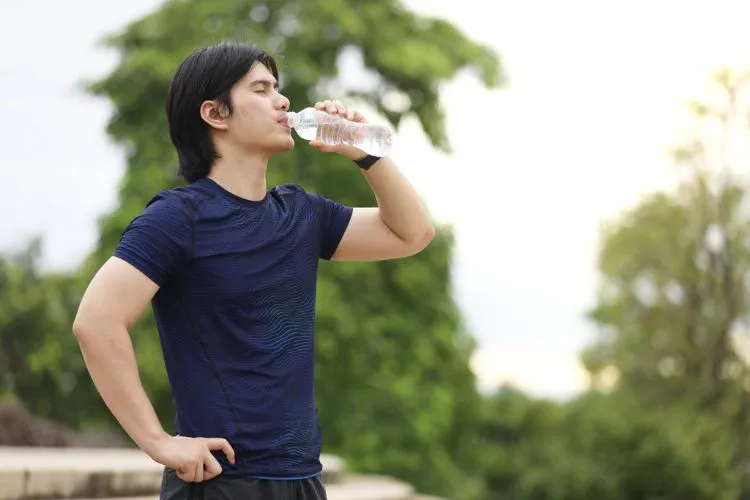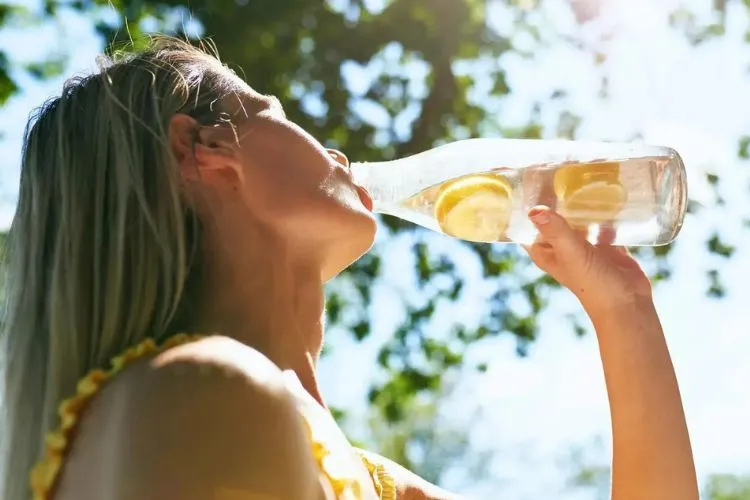Hydration plays a pivotal role in maintaining our health, yet its importance often goes unnoticed.
The human body thrives on water for various critical functions, from the transportation of nutrients to the regulation of body temperature.
But, do you know how many water bottles should I drink a day?
However, determining the exact amount of water one should consume daily can be puzzling, especially when considering the individual differences in hydration needs.
This article aims to unravel the mystery of daily water bottle consumption, guiding you to a hydrated and healthier lifestyle.

💦 Understanding Water Intake
Water is not merely a thirst quencher; it is a vital nutrient. It aids in transporting nutrients and oxygen, keeping joints lubricated, assisting in regulating body temperature, and plays a crucial role in digestion and waste elimination.
The necessity for water cannot be overstated, yet many of us overlook these essential functions.
Individual hydration needs vary greatly due to factors such as age, gender, body size, composition, activity level, and even the climate one lives in.
For instance, an athlete training in hot weather will have significantly higher hydration requirements than a sedentary office worker in a temperate climate.
Additionally, health conditions, pregnancy, and breastfeeding can also significantly affect daily water needs.
💦 How Many Water Bottles Should I Drink a Day?
Health authorities commonly recommend that adults consume about 2.7 to 3.7 liters of water daily, translating to roughly 91 to 125 ounces.
This guidance, however, is an aggregate that includes all fluids consumed, including from food and other drinks.
The “8×8” rule, suggesting eight 8-ounce glasses per day, simplifies this advice but does not account for individual variances in water needs.
Alternatively, some experts suggest drinking half your body weight in ounces of water each day, offering a more tailored recommendation.
💦 Measuring in Water Bottles
Given the diverse sizes of water bottles, understanding your daily intake in terms of bottles requires a bit of math.
For instance, if following a recommendation to drink 64 ounces of water daily, this would equate to approximately four 16.9-ounce water bottles.
Adjusting this calculation based on the specific advice or the size of your preferred water bottle will help personalize your hydration strategy.
💦 Beyond Water: Meeting Your Hydration Needs

It’s also crucial to recognize that hydration doesn’t come solely from drinking water. Foods, particularly fruits and vegetables, and other beverages contribute to daily fluid intake.
However, it’s wise to be mindful of beverages with diuretic properties, such as coffee, tea, and alcohol, which may increase fluid loss and counteract hydration efforts.
💦 Listening to Your Body
The best indicator of proper hydration is your own body. The color of your urine acts as a reliable guide, with pale yellow indicating proper hydration.
Similarly, feeling thirsty is an obvious signal that your body needs more fluids. Paying attention to these natural cues can guide you to adjust your water intake as needed.
Signs of dehydration include dry mouth, fatigue, dark urine, and reduced urination. Being vigilant about such symptoms is essential for preventing dehydration, especially in hot climates or during vigorous activity.
💦 Pro Tips for Staying Hydrated
Several strategies can make maintaining hydration easier and more appealing. Using a water tracking app or setting drinking reminders can ensure regular intake throughout the day.
Flavoring water with fruits or opting for sparkling water can make it more enjoyable, encouraging increased consumption.
Carrying a water bottle ensures you have access to water wherever you go, reinforcing the habit of regular sipping. This simple practice can significantly impact meeting your daily fluid intake goals.
💦 Water Intake Tracking: Tools and Techniques

In the digital age, tracking your water intake has become simpler and more interactive, thanks to innovative tools and techniques designed to promote hydration.
Mobile applications such as “Daily Water Tracker Reminder” and “Hydro Coach” allow users to log their water intake, set reminders, and view their hydration progress over time.
Smart water bottles, another technological marvel, offer a high-tech solution by tracking how much you drink directly through a companion app, sending reminders, and even glowing as a visual cue to take a sip.
For those preferring low-tech methods, carrying a marked water bottle with time indicators or maintaining a hydration journal can effectively help in reaching daily water intake goals.
These tools not only facilitate adequate hydration but also transform it into a manageable and engaging part of daily health routines.
💦 Frequently Asked Questions (FAQs)
Does the amount of water I need change as I age?
Yes. Children, adults, and seniors have differing hydration needs based on their body composition and physical activity level. Additionally, health conditions more common in older adults may affect fluid requirements.
Can I drink too much water?
Though rare, it is possible to consume too much water, leading to water intoxication or hyponatremia, where the body’s salt concentration becomes dangerously low. It’s essential to balance water intake and not exceed your body’s needs.
How does exercise affect my water intake needs?
Physical activity increases sweating, and thereby your need for fluid intake. Drinking extra water before, during, and after exercise is crucial to prevent dehydration.
Are there certain times of the day when it’s better to hydrate?
While you should aim to drink water throughout the day, drinking water upon waking can kickstart digestion and hydrate you after overnight rest. Also, hydrating around 30 minutes before meals can aid in digestion.
How do I know if I’m properly hydrated?
Besides monitoring the color of your urine, simply being mindful of how often you feel thirsty throughout the day can be a good indicator. Ensuring you don’t reach the point of thirst is often a simple guide to maintaining proper hydration.
Conclusion:
In summary, water is the lifeline of our bodies, essential for almost every bodily function.
While general guidelines provide a starting point, understanding and adjusting to your individual hydration needs are crucial.
Listening to your body, calculating your intake based on personal and lifestyle factors, and embracing strategies for consistent hydration will support your health and well-being.
Make hydration a priority, and your body will thank you in numerous ways.

Devon Shorts, a seasoned expert with over a decade of experience in water safety, shares valuable insights on this blog “Aqua Safety Plus”. Trust his expertise to keep your water clean and your family safe.
